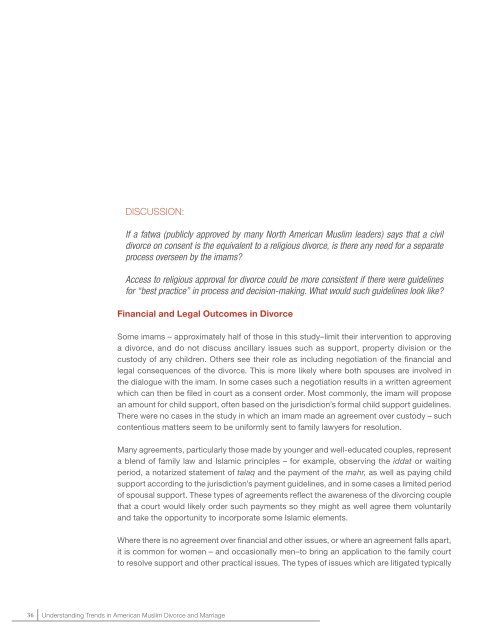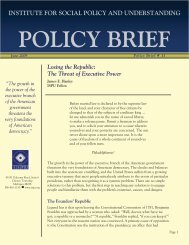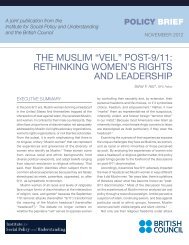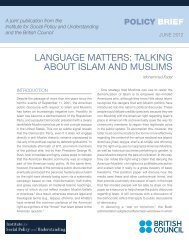Understanding trends in american mUslim divorce and marriage:
Understanding trends in american mUslim divorce and marriage:
Understanding trends in american mUslim divorce and marriage:
Create successful ePaper yourself
Turn your PDF publications into a flip-book with our unique Google optimized e-Paper software.
Discussion:<br />
If a fatwa (publicly approved by many North American Muslim leaders) says that a civil<br />
<strong>divorce</strong> on consent is the equivalent to a religious <strong>divorce</strong>, is there any need for a separate<br />
process overseen by the imams?<br />
Access to religious approval for <strong>divorce</strong> could be more consistent if there were guidel<strong>in</strong>es<br />
for “best practice” <strong>in</strong> process <strong>and</strong> decision-mak<strong>in</strong>g. What would such guidel<strong>in</strong>es look like?<br />
F<strong>in</strong>ancial <strong>and</strong> Legal Outcomes <strong>in</strong> Divorce<br />
Some imams – approximately half of those <strong>in</strong> this study–limit their <strong>in</strong>tervention to approv<strong>in</strong>g<br />
a <strong>divorce</strong>, <strong>and</strong> do not discuss ancillary issues such as support, property division or the<br />
custody of any children. Others see their role as <strong>in</strong>clud<strong>in</strong>g negotiation of the f<strong>in</strong>ancial <strong>and</strong><br />
legal consequences of the <strong>divorce</strong>. This is more likely where both spouses are <strong>in</strong>volved <strong>in</strong><br />
the dialogue with the imam. In some cases such a negotiation results <strong>in</strong> a written agreement<br />
which can then be filed <strong>in</strong> court as a consent order. Most commonly, the imam will propose<br />
an amount for child support, often based on the jurisdiction’s formal child support guidel<strong>in</strong>es.<br />
There were no cases <strong>in</strong> the study <strong>in</strong> which an imam made an agreement over custody – such<br />
contentious matters seem to be uniformly sent to family lawyers for resolution.<br />
Many agreements, particularly those made by younger <strong>and</strong> well-educated couples, represent<br />
a blend of family law <strong>and</strong> Islamic pr<strong>in</strong>ciples – for example, observ<strong>in</strong>g the iddat or wait<strong>in</strong>g<br />
period, a notarized statement of talaq <strong>and</strong> the payment of the mahr, as well as pay<strong>in</strong>g child<br />
support accord<strong>in</strong>g to the jurisdiction’s payment guidel<strong>in</strong>es, <strong>and</strong> <strong>in</strong> some cases a limited period<br />
of spousal support. These types of agreements reflect the awareness of the divorc<strong>in</strong>g couple<br />
that a court would likely order such payments so they might as well agree them voluntarily<br />
<strong>and</strong> take the opportunity to <strong>in</strong>corporate some Islamic elements.<br />
Where there is no agreement over f<strong>in</strong>ancial <strong>and</strong> other issues, or where an agreement falls apart,<br />
it is common for women – <strong>and</strong> occasionally men–to br<strong>in</strong>g an application to the family court<br />
to resolve support <strong>and</strong> other practical issues. The types of issues which are litigated typically<br />
36<br />
<strong>Underst<strong>and</strong><strong>in</strong>g</strong> Trends <strong>in</strong> American Muslim Divorce <strong>and</strong> Marriage






